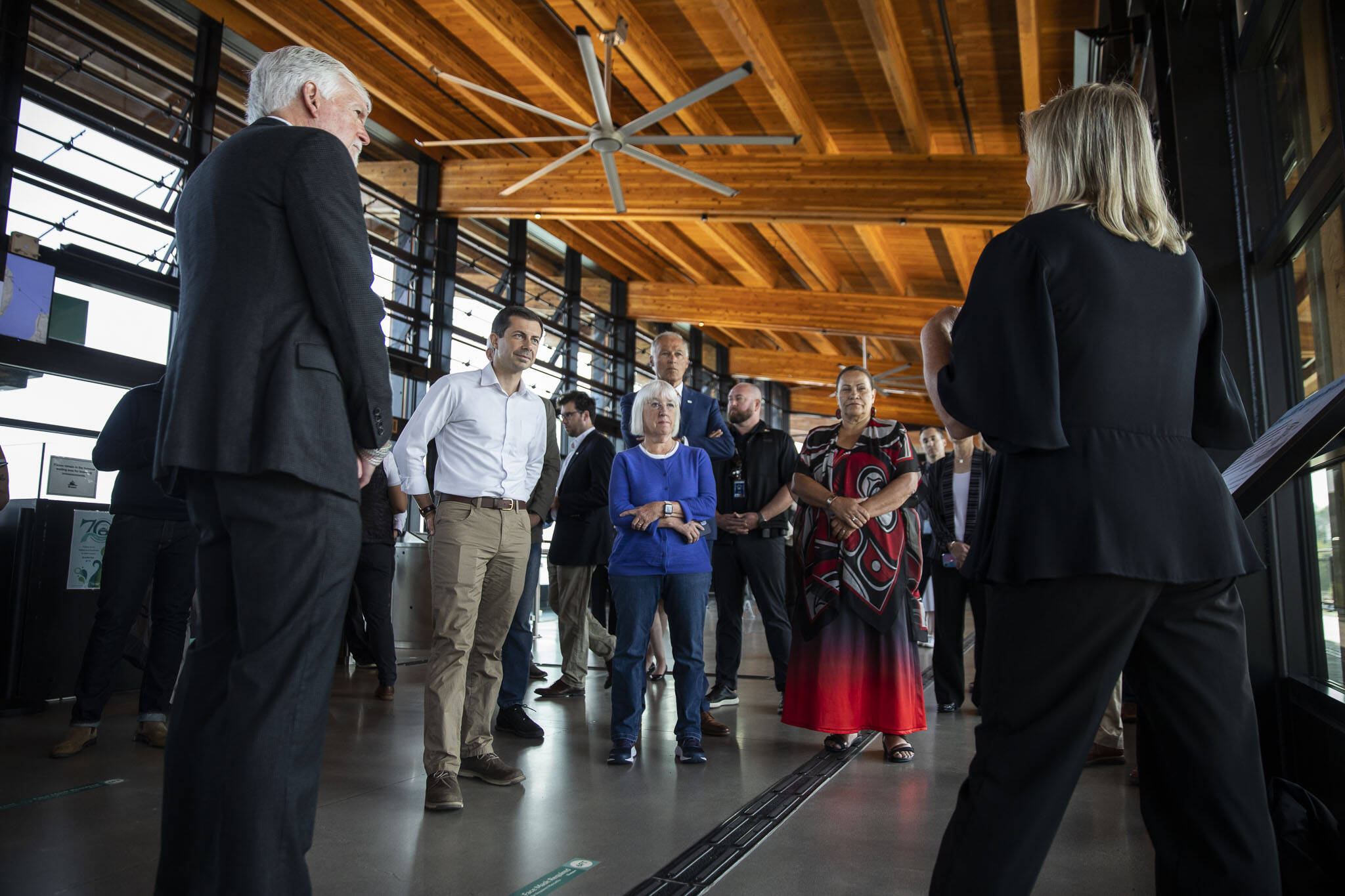U.S. Transportation Secretary Pete Buttigieg visited Mukilteo on Thursday to discuss how federal dollars are improving Washington’s ferry system and infrastructure.
Buttigieg’s visit with Washington state and congressional leaders, including Gov. Jay Inslee, Sen. Patty Murray and U.S. Rep. Rick Larsen, was part of his nationwide Investing in America tour seeking to highlight how the Biden administration is funding major projects across the country. Buttigieg also toured infrastructure in Port Orchard and Washougal, Clark County.
Last year, the federal government awarded the state ferry system $38 million for boat maintenance and renovations, mostly from the $550 billion Bipartisan Infrastructure Law passed to fund projects across the country. This more than doubled last year’s federal funding for Washington State Ferries, the largest ferry system in the country and the second largest in the world.
“Not everybody realizes that ferries are an integral part of the daily commute of so many Americans,” Buttigieg said while touring the second floor of the ferry terminal that overlooks Puget Sound.
Additionally, a $4.9 million federal grant is funding the construction of a ferry charging station in Clinton on Whidbey Island. The station will charge two future hybrid-electric ferries on the Mukilteo-Clinton route. This is part of the ferry system’s transition to an emission-free fleet by 2040, which will help curb the 19 million gallons of diesel fuel the ferry system burns through each year.
The Mukilteo-Clinton route is the start of the electrification process. The state plans to have the first retrofitted hybrid ferry — replacing two diesel engines with batteries — by 2027. The station in Clinton will charge the ferry in the 15 minutes it takes to load and unload passengers throughout the day, then charge during the night.
By 2040, the state plans to have six retrofitted hybrid boats and 16 new electric boats. In the event of an emergency that affects the power grid like an earthquake, hybrid boats would continue to run.
“Gov. Inslee is not only leading the way on climate but understands the importance of infrastructure and has put resources into that,” Buttigieg said.
He also noted the importance of working with tribes “to have this kind of responsible, sustainable transportation growth.”
The Mukilteo ferry terminal is the newest and greenest ferry terminal in the state. It has a roof that captures rainwater, operable windows that negate the need for air conditioning and cement barriers that make it resilient to seawater rise. The terminal was designed like a modern longhouse to honor the tribes who lived on the land and eventually signed the Point Elliott Treaty there almost 170 years ago.
“We were traditionally a fishing tribe who met here,” Tulalip Tribes Chair Teri Gobin said during the visit. “Salmon is the biggest part of our culture.”
Gobin said tribes used to be able to make a good living from fishing, but they now have to subsidize with other activities like crabbing. She said electrifying the ferry system will continue the fight against climate change and help restore fishing runs.
“This is a strategic point in our history to make changes to support the environment,” Gobin said.
Inslee said ferry electrification is part of the Climate Commitment Act the state passed in 2021, which includes creating more sustainable aviation fuel and installing 700 charging stations for electric cars. Despite criticism that the law has raised gas prices, the governor said ferry prices will remain the same.
“We can run these boats less expensively,” Inslee said. “We’re leading the nation in electrifying almost every transportation system, starting with the ferry boats.”
The state ferry system employs about 2,000 people, but the industry needs more workers. Buttigieg said his department’s Low or No Emission Vehicle Program has carved out money for workforce training, including a maritime academy. On July 25, the federal Department of Education will partner with Inslee and Buttigieg’s department to host a meeting in Renton with other governors in the west about supporting the transportation workforce.
Federal funds from the Bipartisan Infrastructure Law are also allocated for improving bridges, railroad crossings and airports across Washington. Rural counties like Island, Whatcom and Skagit counties are each receiving over $5 million for infrastructure projects.
Buttigieg said he is excited to see these plans come to fruition:
“What we have is an opportunity to make investments that should have been done a long time ago.”


